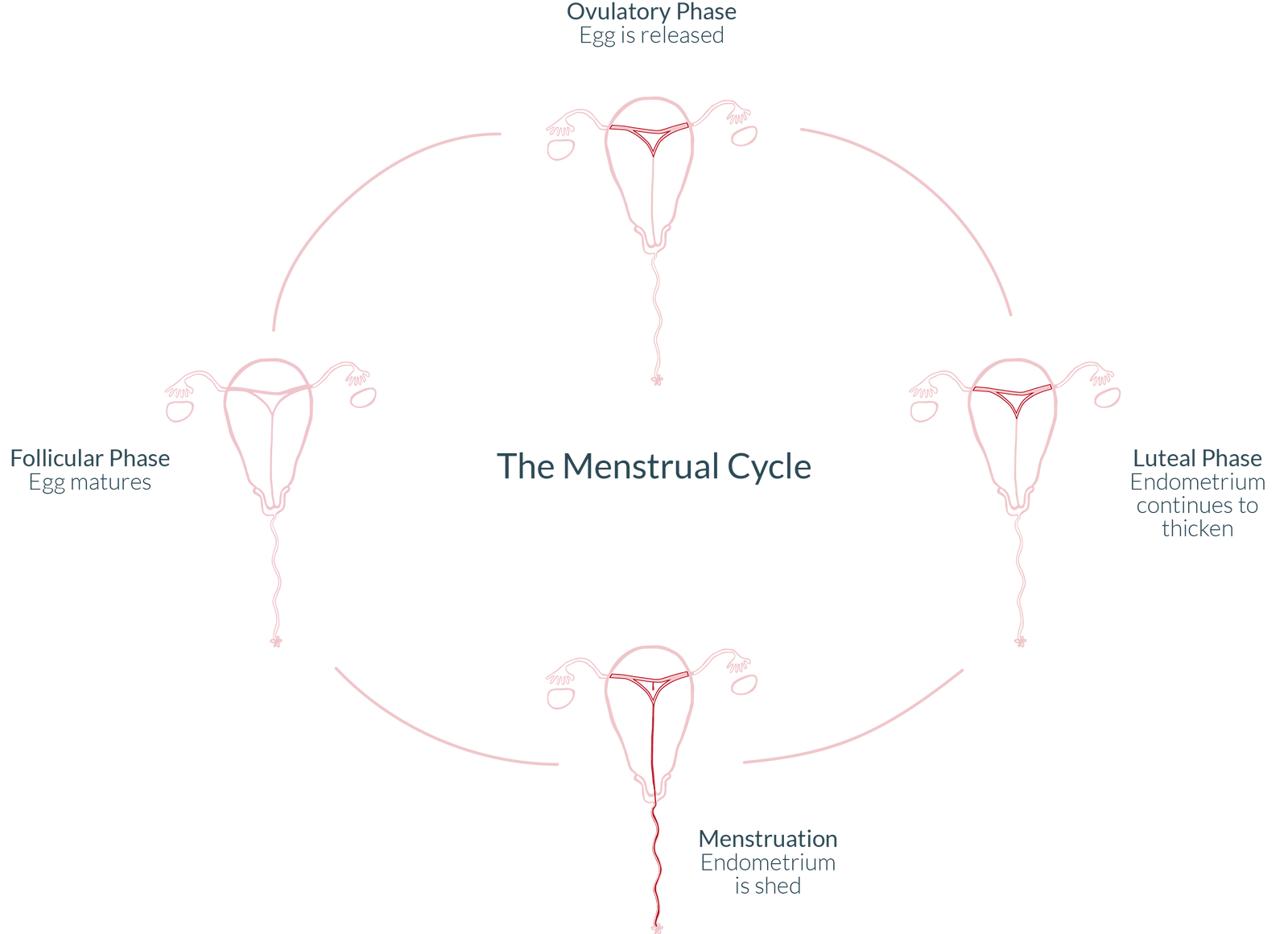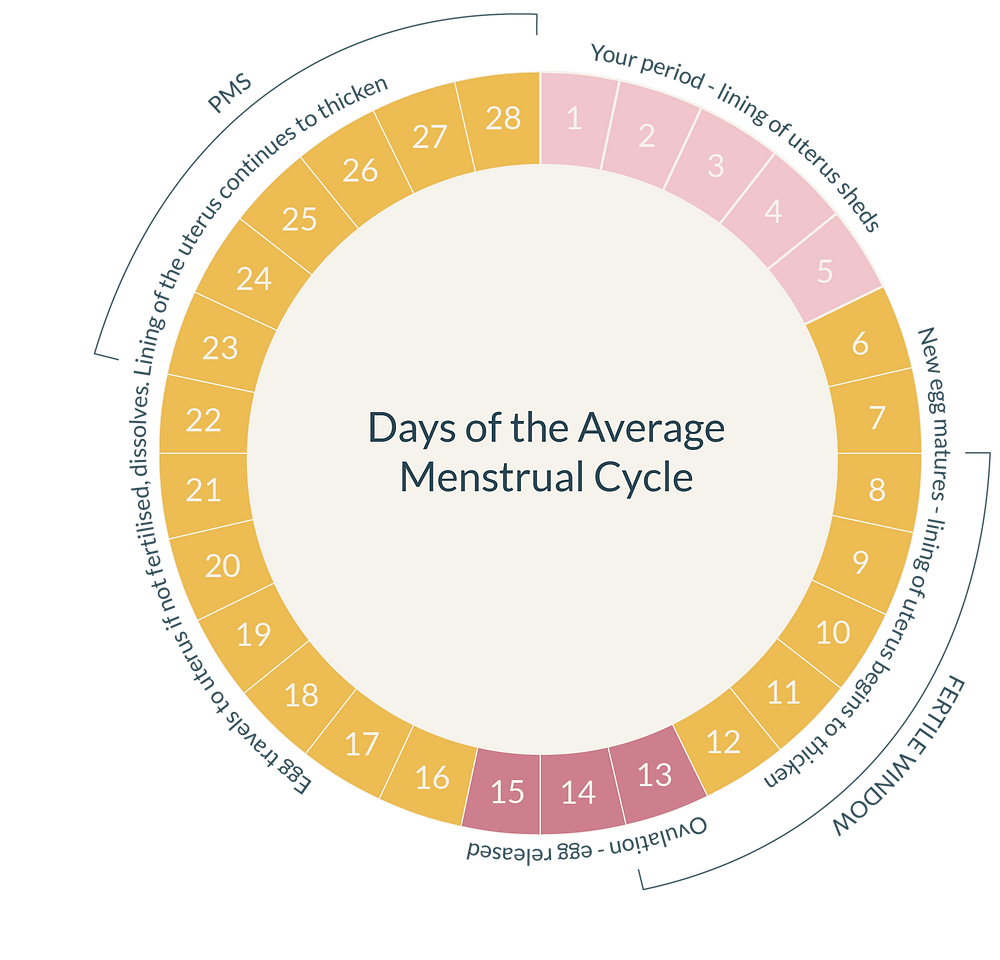Periods 101

For something that happens to half the population every month for approximately half our lives, most of us still have a lot to learn about our monthly bleeding.
We're gonna start from the very beginning. Read on to get Reemi's 101 on periods and all phases of the menstrual cycle.
Periods 101
Menstruation, or period, is normal vaginal bleeding that occurs in bodies with a uterus. Every month, your body prepares for pregnancy. If no pregnancy occurs, the uterus, or womb, sheds its lining. The menstrual blood is partly blood and partly tissue from inside the uterus.
What is a normal amount of bleeding? Can you get pregnant during your period? Why does my period come so often? What is too much pain? Let's find out!
THE AGE OF MENARCHE
Menarche is a fancy word for the very first time you get your period. This usually occurs between the ages of 9 - 15 years old.
Over the course of a lifetime you may experience an average of 450 periods! Most people will reach menopause, the time when their period stops, between the ages of 45 - 55 years old.
It is important to know that once you have your period it is possible to get pregnant. It can also be possible right before your very first period because hormones in the body might already be active.
HORMONES: BEHIND THE SCENES
The menstrual cycle is regulated by hormones; luteinizing hormone, follicle-stimulating hormone, and the female sex hormones estrogen and progesterone.
A menstrual cycle is not just the days that you have your period but is the process of your body preparing for pregnancy and shedding the uterus lining if you are not pregnant.
There are three parts to the cycle that are regulated by each of the hormones.
1. Follicular (before release of the egg)
2. Ovulatory (egg release)
3. Luteal (after egg release)
At each stage, hormones affect many things in your body including digestion, mood, and even your immune system.
WHAT IS PMS?
Premenstrual Syndromeis a group of changes that can affect you on many levels. They can be physical, emotional, or behavioural. The changes come 1 to 2 weeks before your period and have many different symptoms. Once your period starts, they usually go away. It is normal to not feel okay before your period. Don't worry - it will pass! If you feel like PMS is significantly affecting your lifestyle and relationships (with yourself and/or with others) we recommend seeing a medical professional for guidance.
The Menstrual Cycle
-

The endometrium is the lining of the uterus. It is one of the few organs in the human body that changes in size every month throughout a person's fertile years. Pain during your period is from the uterus contracting to help shed its lining.
-

Did you know that sperm can survive up to five days in the female reproductive system? This means that there is a tiny chance of becoming pregnant from unprotected sex during your period.
Facts About Periods That Are Bloody Useful
What is Normal?
Every body is different, including during our period. It is important to know your cycle and your body, so when something changes, it may be an indicator that something is wrong.
Some quick facts:
The average amount of blood lost over your entire period is between 5 - 80 mL. This is about 1 - 16 teaspoons.
A period usually lasts between 4 to 8 days
Time between periods is usually 24 to 38 days long
Most people have some sort of pain during their period and it can begin before your period.
Breast tenderness is another common period symptom. It can peak in the days just before menstruation starts.
For some people diarrhoea or constipation is normal during menstruation, due to hormone changes.
Periods vary from cycle to cycle, and some months will be lighter or heavier, and can differ in how often they occur and how long they go for. There are many reasons why they change including stress, weight changes, age and so on.
Sometimes it can feel like you’re bleeding a whole lot more - that’s because period flow isn’t just blood, it’s also made up of tissue, and mucus that is part of the uterus shedding its lining.
Other common symptoms can include; feeling swollen or bloated, changing emotions and/orfeeling fragile, fatigue, acne, headaches and appetite changes.
When Should I See a Doctor?
It is important to know when your body is sending you a message to pay attention as it can be a warning sign.
Some signs you may need to ask for help:
If you notice a heavy period where you have to change period products every hour or two, or if you’re passing large clots
If the pain is too much, as it can be treated with painkillers or hormones. Even with severe pain there may be nothing ‘abnormal’
If have had your period for more than 2 years and it still doesn't come regularly (about every 4–5 weeks is considered regular)
If you have bleeding between periods
If your periods that last more than about a week
If PMS is so severe that gets in the way of your everyday activities
If you have bleeding, pain or other symptoms that are disrupting your life, then ask for help! Talk to your GP or book an appointment with Family Planning in your area.
Can I Get Pregnant Just After My Period Has Finished?
Yes, although it's not very likely. If you have sex without using contraception, you can conceive (get pregnant) at any time during your menstrual cycle, even during or just after your period.
You can also get pregnant if you have never had a period before, during your first period, or after the first time you have sex.
There's no "safe" time of the month when you can have sex without contraception and not risk becoming pregnant.
But there are times in your menstrual cycle when you're at your most fertile, and this is when you're most likely to conceive.
Info from the NHS
PMS Is Not An Urban Myth
Premenstrual syndrome (PMS) has a wide variety of signs and symptoms, including mood swings, tender breasts, food cravings, fatigue, irritability and depression. It's estimated that as many as 3 of every 4 menstruating women have experienced some form of premenstrual syndrome.
The exact cause, however, remains a mystery.
In 30 percent to 40 percent of cases, symptoms are so severe that they interfere with normal day-to-day functioning. Once passed off as simply an unpleasant-but-inevitable part of being a woman, the symptoms many experience in conjunction with their monthly period are finally being seen as what they are -- signs of a legitimate medical problem.
Symptoms generally strike five-to-10 days before the period and dissipate with its start or soon after. But it's not "all in your head," as you've probably been told. Research has determined that women aren't imagining anything -- and, thankfully, there's help.
Some Common PMS Symptoms
moodiness
depression
abdominal cramping
bloating
food cravings
headaches
muscle aches
breast tenderness
fatigue
acne
When Should I See a Doctor?
"If you have to give up an aerobicsclass, that's one thing," says Dr. Michelle Warren, professor of obstetrics and gynecology at Columbia University. "But if symptoms interfere with your normal activities, if you can't concentrate, if you have to stay home and lie down, that's abnormal."
Information from WebMD
Do I Have Endometriosis?
Nearly one in 10 women experiences the chronic pain of endometriosis, but for many the symptoms are dismissed. Unfortunately, it's important to be your own advocate as many health professionals still don't take this issue seriously.
Endometriosis comes with a tangled knot of symptoms, many of which are characterized by extreme pain. Painful sex. Painful urination and bowel movements. Menstrual cramps that cause stabbing pain and aches in the abdomen and lower back. Gastrointestinal disruptions, like painful diarrhea and constipation, which patients often confuse for signs of another health issue.
Emerging research is investigating what causes endometriosis and why some people may be more susceptible than others. Studies have shown a link between endometriosis and physical and sexual abuse in childhood or adolescence. Scientists are also exploringwhether the disease is hereditary: Though the data is inconclusive, some doctors consider a family history of endometriosis to be a risk factor.
I Thought It Was Just Me
My Boobs Get Sore
A very common symptom of PMS is breast tenderness starting from ovulation to just before your period begins. This pain is cyclical and flows with the rise and fall of estrogen and progesterone levels. There are some interesting links between caffeine consumption and breast tenderness before a period, although mroe research is needed.
So whilst sore breasts leading up to a period is considered normal, there are ways to potentially reduce this like limiting caffeine consumption, following a lower fat, whole foods diet, and having a supportive well-fitting bra.
Information from flo.health
I Feel Sad
After ovulation, the hormones estrogen and progesterone begin to fall and these changes can affect the brain's neurotransmitters.
Neurotransmitters, serotonin and dopamine, are both chemicals that influence mood, motivation and sleep. Low levels of these can cause feelings of sadness, irritability and anxiety. These hormones begin to rise again at the onset of a period.
Information from medicalnewstoday.com
I Get The Runs On My Period
When we (Reemi team) found out about this we had one of those 'oh it's not just me!' moments. Read on to know you're also not alone.
Your gastrointestinal system is influenced by your menstrual cycle and can affect your digestion and stools. It's common to have abdominal pain, diarrhea, indigestion, constipation and reflux around your period, especially the first day of bleeding.
If you already experience bowel discomforts like IBS you will likely be more prone to further upset during your period.
Information from helloclue.com
My Asthma & Allergies Are Worse Before My Period
There is some research to suggest that hormonal changes do indeed affect asthma suffers due to potentially decreased airflow during and right after menstruation. So if your asthma and allergies worsen during your menstruation please know you're not alone although much more research is needed into understanding this further.
Information from healthline.com
I'm Craving...
The body regulates estrogen and cortisol so that when estrogen increases or decreases, cotisol also increases or decreases. As estrogen increases before your period, cortisol also increases putting the body in a more elevated state of stress and in turn high metabolic stimulation. Your appetite therefore increases and cravings for foods high in carbohydrate and fats dominate.
During PMS, serotonin drops, which causes cravings for carbohydrates. Carbohydrates are used in serotonin production, so the body signals you to eat them in an attempt to counter the dip. If your cortisol is high and serotonin is low, you are likely to crave simple and sugary carbohydrates (aka why many women crave chocolate). If your cortisol is high and your serotonin level is relatively normal, you will likely crave foods high in fat and high in carbs.
Information from gardenobgyn.com
My Period Isn't Every 28 Days
The commonly quoted period of 28 days actually occurs in only 1/10 women.
A cycle can be anywhere from 21 to 40 days and some people will never have a very regular cycle.
Information from healthnavigator.org.nz
I'm Horny Before My Period
Changes in hormonal levels throughout our cycle affect our desire to want to have sex, particularly testosterone and estrogen are linked with sexual desire. Estrogen begins to peak during ovulation which usually increases the desire to have sex, combined with being most fertile during ovulation in order to procreate.
But is's also very common to feel horny during your period. This could be due to a few factors, such as an increase in blood-flow to the pelvic region, psychological reasons knowing that pregnancy is less likely (although still possible),
Information from mindbodygreen.com
I Just Don't Have The Energy
Estrogen production increases during the first half of the menstrual cycle and decreases during the second half. Serotonin levels often decline in line with decreasing estrogen levels resulting in a low mood and/or low energy levels.
Being aware of this and giving your body a little extra rest is advised. Look after yourself and always a good idea to check your iron levels, especially if you do have particularly heavy periods.
information from medicalnewstoday
I'm In So Much Pain
Period pain is usually felt as painful muscle cramps in the tummy, which can spread to the lower back and thighs, sometimes felt as intense spasms or a dull aching pain.
Period pain happens when the muscular wall of the womb contracts. During a period, the wall of the womb starts to contract more vigorously to help the womb lining shed. This compresses the blood vessels that line the womb, temporarily cutting off the blood supply and as the oxygen supple is cut off the tissues in the womb release chemicals that trigger pain.
While your body is releasing these pain-triggering chemicals, it's also producing other chemicals called prostaglandins. These encourage the womb muscles to contract more, further increasing the level of pain.
It's not known why some women have more period pain than others. It may be that some women have a build-up of prostaglandins, which means they experience stronger contractions.
Information from nhs.uk
My Period Blood Colour is Unusual
It's normal for period blood to vary pink to red to brown. The color of period blood can change during our periods, as well as during different times in our lives. For example, blood can start out bright red in the beginning and change to a rusty brown at the end of the cycle. It can even start as brown in the beginning and turn redder towards the end of your period.
Information from webmd.com
Caffeine Makes My Cramps Worse
There are some studies to show that limiting caffeine intake on your period can have positive effects on cramps. Caffeine blocks a hormone that can make blood vessels (which are present in the uterus) smaller, slowing the flow of blood.
Coffee can also cause inflammation and bloating, adding to stomach pain.
Some alternatives to coffee when you're menstruating are various types of tea, albeit lower in caffeine like green or black teas, or completely caffeine-free options of herbal teas like chamomile, peppermint, red raspberry leaf and ginger along with many others.
Information from flo.health
I Can't Sleep
Multiple studies have found that sleep worsens during the late-luteal phase (when PMS arises) in comparison with other parts of the menstrual cycle. Progesterone, which increases after ovulation until the late-luteal phase, increases body temperature, to an extent that can sometimes cause fragmented sleep. Melatonin also appears to be altered during menstruation causing inconsistent sleep. REM sleep has also been shown to be impacted during the late-luteal phase.
Information from Sleepfoundation.org
Alcohol Makes Me Sad?
It's difficult to attain the impacts of alcohol on our menstrual cycle, but it is estimated that alcohol consumed in your luteal phase (second half of your menstrual cycle) may have more of an impact on your emotions, both negative and positive.
Just like a lot of aspects of our menstrual cycle more research appears to be needed for more conclusive results, but if this is you, you're not alone.
Information from helloclue.com
Subscribe to our emails
We have some exciting things happening. Sign up here to be part of the journey!


